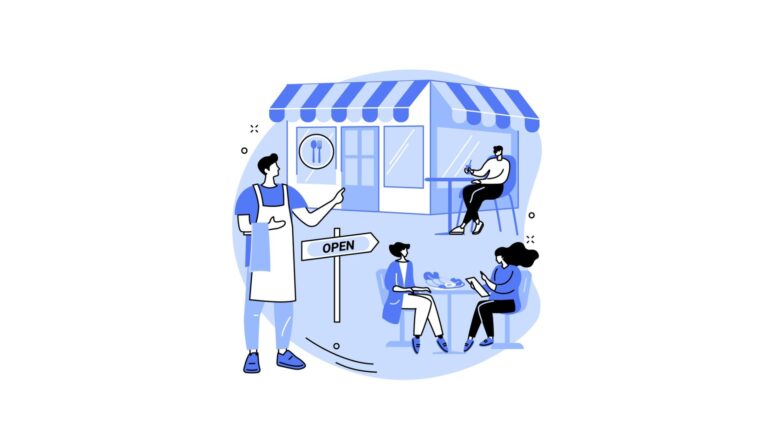Soft skills—such as critical thinking, time management and communication skills—define how we interact with others, how we adapt to change, and how we solve problems.
These skills are harder to measure than hard skills like tech knowledge or safety procedures.
However, companies that prioritize and encourage soft skill development can find a critical edge in their workforce.
Creating soft skills training can be difficult, though, and many off-the-shelf training products don’t deliver results.
To help you out, in this article, we’ll explain why soft skills matter today and guide you on how to develop training that works.
We’ll also look at the role software plays in training and encouraging soft skill development.
Key Takeaways
- Soft skills are key to building relationships, effective teamwork, problem-solving, innovation, and adaptability.
- The quality of employees’ soft skills has a direct impact on company culture and can be a major asset to the business as a whole.
- Business outcomes are strongly tied to soft skills, and companies that ignore these skills can suffer from unsavory consequences.
- Training software has made learning and developing soft skills easier and more accessible than ever.
What Are Soft Skills?
Soft skills are personal traits and abilities that help people interact. They’re beneficial at work and in an employee’s personal life.
How employees communicate and connect with others is influenced by their soft skills. Soft skills include abilities like actively listening, expressing ideas clearly, and understanding and managing emotions. These work together with hard skills to make employees more effective.
Unlike hard skills, which are specific to a job or industry, soft skills benefit many different roles and industries. They’re important for building good relationships with others and working well in teams. They also help employees adapt to change and creatively solve problems.

What Are the Most Important Soft Skills for Success in the Workplace?
Soft skills transition across different roles and industries, so developing them can benefit employees across their entire careers. With more than a quarter of Americans considering a career change, it’s easy to see how these transitional skills can provide an edge for career growth.
These are the 12 most important soft skills employers look for in their employees and new hires:
Communication
What is it? The ability to convey information clearly and listen to feedback. This includes developing and processing information in written and verbal formats.
Key traits
- Clarity
- Active listening
- Recognizing nonverbal cues
- Persuasion
Critical thinking
What is it? The ability to think logically, analyze information, evaluate options, and make reasoned judgments.
Key traits
- Logical reasoning
- Analytical thinking
- Open-mindedness
- Attention to detail
Time management
What is it? Managing priorities and setting deadlines for your own work. This may also include setting goals for others and ensuring group work stays on track.
Key traits
- Prioritization
- Organization
- Planning
- Efficiency
Problem-solving
What is it? The ability to analyze a problem objectively and identify solutions. This skill allows you to make effective decisions to overcome obstacles.
Key traits
- Systematic approach
- Analytical thinking
- Resourcefulness
- Persistence
This Might Interest You
We’ve rounded up the most common workplace communication problems and explained how you can resolve them effectively.
Collaboration
What is it? Employees with this skill work well with others. It involves being a team player and being able to contribute in group settings. It also means making the most of group versus individual work time to benefit your team.
Key traits
- Cooperation
- Active listening
- Flexibility
- Consensus-building
Resilience
What is it? This skill lets you bounce back from mistakes or setbacks. Resilient employees are more likely to maintain a positive attitude in the face of adversity. They’re also more likely to demonstrate perseverance in the face of challenges.
Key traits
- Perseverance
- Optimism
- Growth mentality
- Learning agility
Empathy
What is it? This skill helps you to be aware of other people’s feelings. Empathetic people are more able to put themselves in another person’s shoes and view the world from more than one perspective. This makes it easier to get along with colleagues and helps teams work together.
Key traits
- Compassion
- Active listening
- Emotional awareness
- Understanding
Creativity
What is it? Creativity encourages you to think outside the box and generate innovative ideas. Employees with strong creativity are better able to approach challenges with a fresh perspective and identify opportunities for improvement.
Key traits
- Originality
- Curiosity
- Flexible thinking
- Risk-taking
Emotional intelligence
What is it? The ability to understand and manage your own emotions. This allows you to remain aware of how your response to a situation is likely to be perceived. People with high emotional intelligence are better equipped to balance their own emotions with those around them. This is a particularly helpful skill for managers, who need to account for their team’s response to changes in addition to managing their own reactions.
Key traits
- Self-awareness
- Self-regulation
- Motivation
- Awareness of non-verbal cues
Leadership
What is it? This skill involves your ability to inspire and motivate others. Strong leadership skills are visible in how you provide guidance and direction. They also impact how effective you are in managing and delegating tasks.
Key traits
- Strategic vision
- Active listening
- Decision-making
- Accountability
Did You Know?
Great leadership is a major contributor to high levels of employee engagement. Discover the 6 ways your management skills can help engage your workforce.
Conflict resolution
What is it? Conflict is inevitable in work and life. Those with strong conflict resolution skills are better able to find win-win solutions and maintain positive relationships during and after a conflict. They’re also more likely to choose their words carefully and avoid inflammatory arguments.
Key traits
- Negotiation
- Diplomacy
- Patience
- Open-mindedness
Relationship building
What is it? Networking to build and nurture professional relationships can help you throughout your career. Those with strong relationship-building skills are able to establish connections and regularly engage with others.
Key traits
- Trustworthiness
- Respect
- Active listening
- Positive attitude
How Soft Skills Improve Company Culture
Company culture is heavily affected by soft skills. By prioritizing and nurturing these skills, companies can create a positive and collaborative work culture.
Let’s look at how soft skills improve company culture.
Encourage collaboration and teamwork
Employees need to be able to build relationships and achieve common goals. Developing soft skills like good communication and empathy helps build a supportive culture that values collaboration and teamwork.

Build communication and transparency
When employees can express themselves clearly and feel safe offering feedback, they’re more likely to be engaged at work. This leads to a culture where information is freely shared.
Help create a culture of learning
Leadership soft skills, like understanding and motivation, play a big role in shaping company culture. Good leaders inspire their teams, guide them, and help them grow. When leaders focus on employee development, it creates a culture of learning and engagement.
Support conflict resolution
Employees that can provide constructive criticism and manage conflict improve company culture. These workers are better equipped to collaborate and less likely to have conflict derail their efforts.
Promote adaptability and resilience
When employees can adapt to new situations, it creates a culture that embraces change rather than rejects it. This in turn encourages a positive mindset where workers remain productive and even in the face of adversity.
Encourage trust and respect
Soft skills like understanding others and listening well help build trust and respect among employees. When there is trust and respect in the company, it creates a supportive and inclusive culture.
This Might Interest You
Learn more about building your company culture with these 9 tips and tricks!
5 Ways Soft Skills Training Benefits Business Outcomes
While soft skills can be harder to measure than hard skills, properly training your employees in them can have a major impact on your business. A study conducted by the MIT Sloan School of Management found that a year-long soft skills training program resulted in a 250% return on investment.
So, how can soft skills help your business improve outcomes? Here’s a look at the top 5 ways training employees to use soft skills can benefit your business:
Enhance customer service
Positive customer experiences are the lifeblood of successful businesses. On the other hand, negative customer experiences can have significant consequences like brand-damaging reviews, loss of customer loyalty, and drops in repeat business.
Good customer service relies on vital soft skills like empathy, active listening, and problem-solving. These skills help your customer service employees provide personalized solutions and retain happy customers.
Improve communication and collaboration between employees
Soft skills like listening and empathy enhance communication within your business. Teams that have developed soft skills are more likely to collaborate effectively within the team and with others in the organization.
As a bonus outcome, this improves employee engagement by building trust and opening the door to multiple viewpoints.
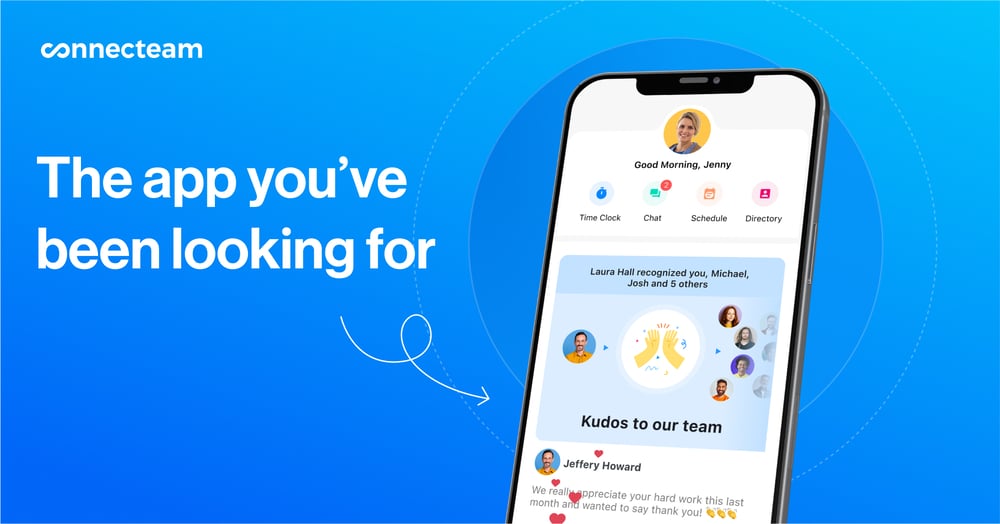
Build change resilience
As your business evolves, employees with strong soft skills like adaptability, resilience, and problem-solving are better positioned to thrive. They’re able to maintain a positive mindset, be flexible in the face of change, and embrace new situations—all while remaining productive.
In turn, these employees ensure your business can quickly adapt to market shifts and changing customer preferences.
Foster innovation
The pace of innovation in business is only getting faster. Businesses that promote soft skills like critical thinking and creativity are best positioned to stay ahead of the curve. Employees that have developed these soft skills can think outside the box, generate new ideas, and find innovative solutions to problems.
Develop better managers
With 82% of US employees willing to leave their job because of a bad manager, it’s easy to see how training leaders on soft skills can impact employee retention and company culture.
Strong managers with skills like emotional intelligence and empathy can motivate and inspire their teams. They also greatly contribute to business goals because they understand their team’s obstacles and motivations.
Best Methods for Training Your Employees on Soft Skills
Workshops and seminars
Workshops and seminars provide structured opportunities for employees to learn about and enhance their soft skills in a focused, interactive environment.
They help participants learn new concepts, practice soft skills, and engage in discussions with peers. They are spaces where you can offer your employees real-life examples and practical exercises. These sessions enable employees to apply their learning directly to their work.
Workshops and seminars on soft skills can be conducted internally by subject matter experts within your organization. You might also consider hiring external professional trainers where appropriate.
Mentoring and coaching
Mentoring and coaching are highly effective methods for developing soft skills. Pairing employees with experienced mentors or coaches allows for personalized guidance and support.
Mentors and coaches can share their experiences and offer constructive feedback to employees. This helps workers identify areas for improvement, set goals, and work towards enhancing their soft skills.
On-the-job training
This training method is often used to develop hard skills. However, on-the-job training is also a valuable approach to take when developing soft skills. By letting employees apply soft skills in their day-to-day tasks, they can learn by doing and refine their abilities.
Supervisors and managers can play a pivotal role in facilitating on-the-job training. After delegating tasks that need soft skills, supervisors can evaluate the employee in real time. They can then provide constructive feedback and guidance.
Role-playing
Role-playing is an effective technique for practicing and honing soft skills. This training method can simulate real-life scenarios and ask employees to interact in ways that require soft skills.
Role-playing is especially helpful for skills like communication, problem-solving, and conflict resolution. It lets employees develop skills in a safe and controlled environment.
By receiving feedback from peers or facilitators, employees can identify areas for improvement. Repetition of these simulations can also help employees refine their approaches.
Feedback and performance reviews
Regular feedback plays a crucial role in the development of soft skills. Constructive feedback helps individuals understand how their soft skills impact their work.
While helpful for identifying areas for improvement, feedback should also cover employee strengths.
Incorporating soft skills evaluation into performance reviews is a formal way to identify skills gaps. It also provides an opportunity to highlight targeted training and set improvement goals.
Peer-to-peer learning
Peer learning can take various forms, such as peer coaching, team projects, or group discussions. By actively engaging in discussions and sharing experiences related to soft skills, employees gain new insights. They can learn from diverse perspectives and develop their soft skills with peer support and feedback.
E-learning
E-learning and online courses offer flexible and accessible training options for employees. Employees can access a wide range of soft skills courses and complete them at their own pace and convenience.
E-learning modules incorporate elements like quizzes, videos, and case studies, to engage learners. Mobile courses allow employees to practice skills on the go, making it a convenient method for training on soft skills.
Interactive learning
Interactive learning enables employees to practice their soft skills in a collaborative environment.
This type of learning can include team-building activities and group projects, which foster teamwork, communication, and problem-solving skills. It also promotes engagement and retention of information.
Bonus tip: Continuous learning
Providing employees with easy access to resources like books, articles, podcasts, and online platforms encourages self-directed learning. You can even curate a library of resources and recommend materials relevant to soft skills.
Encouraging employees to continue working on their soft skills shows that you value this development and will improve the quality of soft skills across your organization.
Use Connecteam to Roll Out Soft Skills Training to Your Employees
Leveraging software for soft skills training can enhance the learning experience and make it easier to track progress. Personalized training can be delivered at scale with the right software supporting your training efforts.
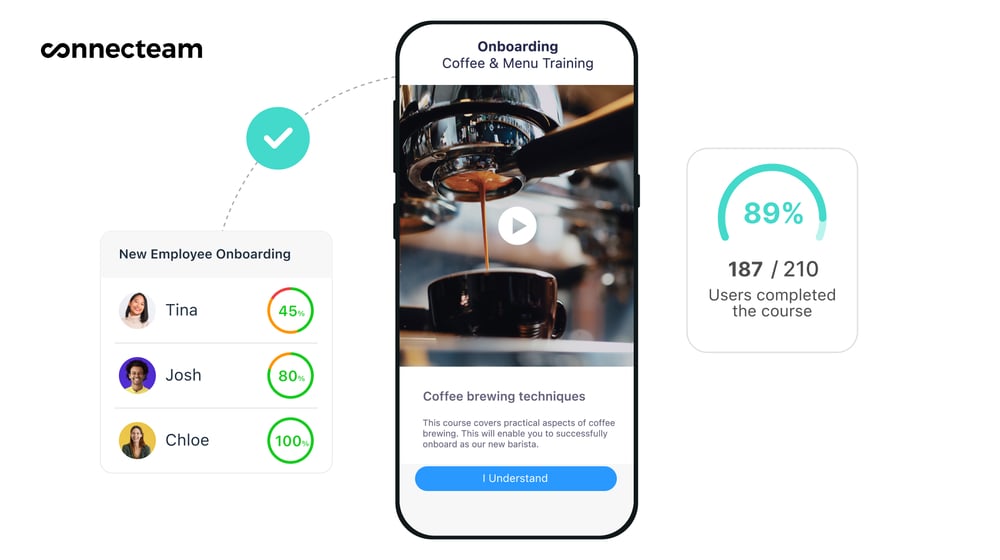
Connecteam is an all-in-one employee management system that includes robust tools for employee training. Our platform makes it easy to roll out soft skills training with custom course content tailored for your business.
>> Get started with Connecteam for free today! <<
Quickly create custom soft skills training
With Connecteam, building a new course or course library is simple. Use templates or create courses from scratch—incorporating text, images, and even videos into each one.
Your existing training materials won’t go to waste either. Add images, videos, audio recordings, PDFs, and more to your courses or upload them as extra resources.
You can create as many topic sections as you need to keep training organized and group related courses into segments. This ensures trainees aren’t overwhelmed but too much information at once.
Connecteam also enables you to add quizzes to courses. This supports knowledge retention by offering a simple way to check that employees fully understand the training content.
Workers can complete training straight from their mobile devices, and Connecteam will send automated alerts to remind employees to complete training.
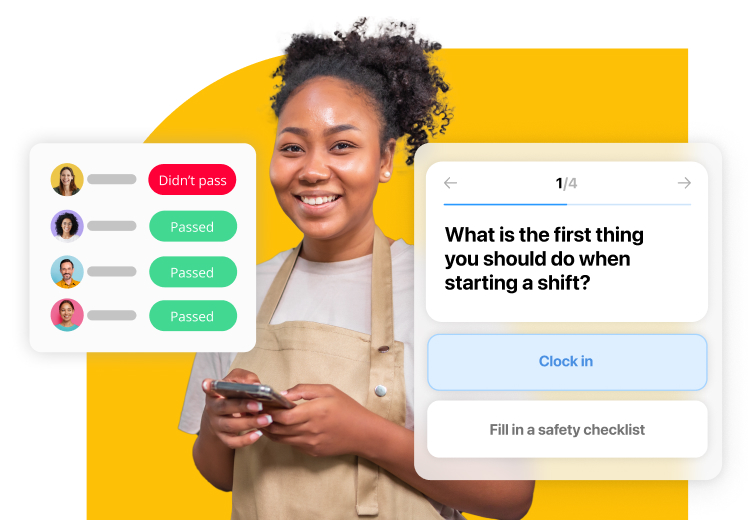
Help employees fit training into their schedule with micro-training
Micro-training, also known as bite-sized learning, delivers training content in short, focused modules. It promotes better knowledge retention through concise learning experiences.
Connecteam helps you break down soft skills training into individual lessons. Employees can then consume these lessons at their own pace.
Training modules are accessible via the Connecteam mobile app, making it easy for employees to engage in micro-training. They can fit short bursts of learning into their schedules and complete sessions on the go.
Create live training workshops
Connecteam’s company event scheduler enables you to create and manage any kind of work event and drive interest with in-app notifications.
The scheduler is great for organizing in-person soft skill training workshops. Add dates and details for your training workshops, invite team members, gather RSVPs, and monitor attendance to ensure training moves forward smoothly.
>> Get started with Connecteam for free today! <<
Track progress and gain feedback
It’s vital that you stay on top of employee training progress. Connecteam makes this easy with a comprehensive admin dashboard that displays real-time progress details and training activity insights. At a glance, you can see who’s progressing well and who might need additional support to complete training.
Furthermore, Connecteam’s surveys and live polls enable you to gather employee feedback on training. Build surveys using templates, or create them from scratch in a number of formats, including multiple-choice, open-ended, yes/no, and rating scale questions. You can then use the insights to adjust your training content and approach as needed.
Store training resources in the knowledge center
Connecteam also enables you to create a knowledge center for your business. Think of it like a digital library that can store training manuals, policy and procedure documents, your employee handbook, worksheets, and more.
Employees can access the knowledge center at any time to review training materials and get answers to common questions. Custom access permissions ensure employees view only the materials relevant to their roles and responsibilities.
There’s also no storage limit, so you can fill the knowledge center with as much information as you need to.
Encourage peer-to-peer learning
Peer-to-peer learning involves workers sharing knowledge and expertise with one another. With Connecteam’s secure in-app chat, you can encourage this type of learning at your organization.
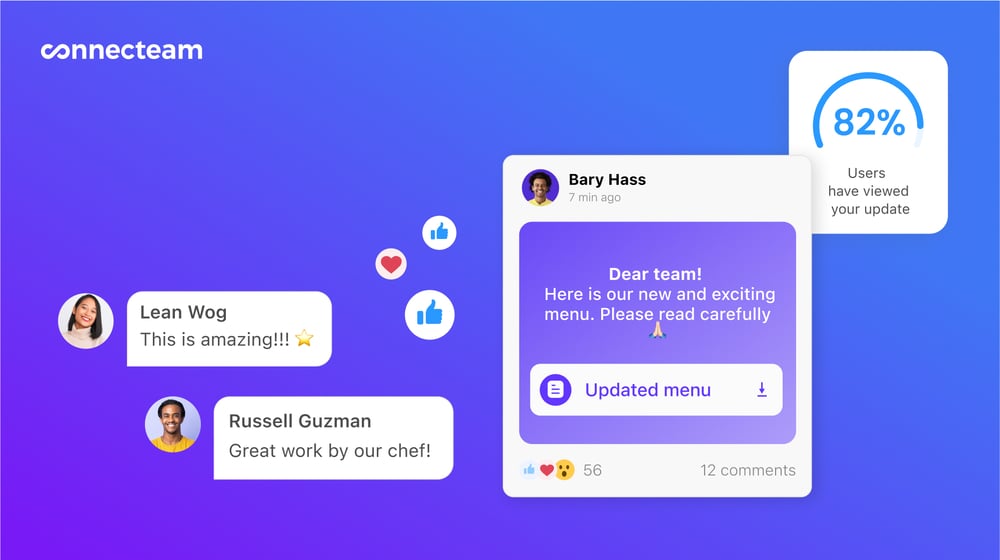
Employees can communicate one-on-one or create groups to chat about what they’ve learned and how training can be implemented in day-to-day work.
This can be particularly helpful for soft skill development because it reinforces useful skills over time. When employees receive support and encouragement from their colleagues, it’s easier to improve their soft skills in the long term.
Ongoing discussion also promotes a collaborative learning culture and encourages the exchange of diverse perspectives and ideas.
>> Get started with Connecteam for free today! <<
Conclusion
Soft skills present a unique challenge for businesses. On the one hand, they’re subjective and dynamic, which makes them difficult to measure. On the other hand, businesses that develop their employees’ soft skills can see large improvements in business outcomes and corporate culture.
To implement soft skills training at your business, use a mix of formats and delivery methods. These can include workshops, e-learning, performance reviews, peer-to-peer learning, and mentoring. It’s also a great idea to use training software like Connecteam. Its features—like mobile access, custom course creation, and in-app communication—keep employees engaged and able to complete training at their own pace.
By developing soft skills training, your business can reap the benefits of improved collaboration, better communication, and strengthened customer relationships. All of this ultimately drives business success that lasts.
FAQs
Can soft skills be taught?
Yes, soft skills can be taught and developed. Some people seem to naturally possess certain soft skills, but anyone can develop them with practice.
Soft skills training focuses on helping individuals to develop their soft skills. Training programs often include interactive activities, role-playing, and feedback sessions. These help individuals understand and apply soft skills in real-world scenarios. On-the-job training, mentoring, and continuous learning opportunities also contribute to soft skill development.
Everyone has the capacity to improve and cultivate their soft skills with proper guidance and effort.
Why are soft skills hard to learn?
Soft skills can be challenging to learn for several reasons:
- Soft skills are subjective. They involve personal qualities and ways of interacting. Contrast this with hard skills, which generally rely on specific guidelines for success. Soft skills can vary based on situational contexts and are often difficult to define.
- Soft skill development requires self-awareness. It can be challenging for individuals to recognize their own areas for improvement. Supporting soft skill learning requires creating a safe space for honest self-reflection.
- Soft skills require ongoing improvement. They’re influenced by personal growth, company culture, and evolving social dynamics. A commitment to continuous learning is needed for soft skills to grow.
While soft skills present challenges, everyone has the opportunity to learn. A supportive learning environment and accessible training resources can make soft skills attainable for all employees.



